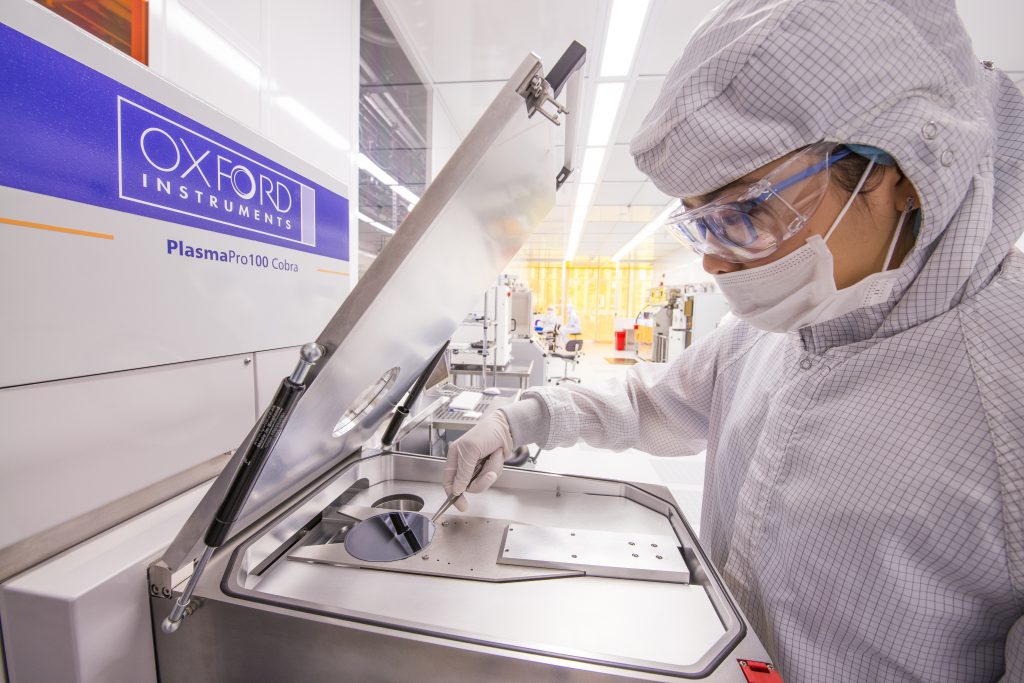Quattrone Nanofabrication Center: Providing Critically Needed Real-World Opportunities for Students
“Our purpose is to foster an environment to enable our students to pursue their ultimate goal, whether it be industrial or academic, with a confidence and competitive advantage from this training that most universities, due to resources and staffing, aren’t able to provide.”
– Gyuseok Kim – Principal Scientist, GSF Program
The reality of today’s academic environment is many engineering master’s level students graduate with limited practical experience in a lab environment, which is desirable for neither the students, nor the companies looking to hire bright young minds. The staff at the Quattrone Nanofabrication Facility noticed this glaring gap and determined that a solution was needed. Thus the Graduate Student Fellows (GSF) Program at the Quattrone Nanofabrication Center was born.
What became apparent to Noah Clay, Director of the Quattrone Nanofabrication Facility, is that in the “real world,” industries seek to hire graduates who are ready to hit the ground running. This is a difficult task when most graduating students don’t have much, if any, practical experience (meaning lab hours) under their belt.
Gyuseok Kim, Principal Scientist, who manages the GSF program states, “Our purpose is to foster an environment to enable our students to pursue their ultimate goal, whether it be industrial or academic, with a confidence and competitive advantage from this training that most universities, due to resources and staffing, aren’t able to provide.”
The GSF Program is designed to provide such skills and hands-on opportunities to Penn Engineering Master students in the Nanotechnology program, and close the gap these students face as they move from an institute of higher learning to employment to a full-time employment opportunity.
Program Overview
GSF Program students receive practical experience in the Singh facilities, and obtain valuable insight to process development, cleanroom hygiene and teamwork principles. Program participants are encouraged to become independent problem solvers and to work with others to acquire new skill sets via tools available through the innovative Singh environment.
The Goals of the GSF Program are Two-Fold:
The first goal is to afford participants a unique nanotechnology experience that is tailored to their interest and strengths. As a team, they build a community and relationships that extend beyond the lab.
The second goal is to remove the burden from hiring industry managers or research faculties in the nanotech space who are actively seeking for talent with minimal cleanroom experience. This means that the Singh Center assumes the overhead cost to train aspiring process engineers and scientists. To date, GSF has mentored more than 40 students, with plans to hire additional new students in the near future.
Project Focus
Students work on a variety of projects, spending up to seven hours per week in the Quattrone Nanofabrication facility. Projects fall into two categories:
– Fundamental and Advanced Process Integration
– Device R&D and Fabrication
Project Performance, Documentation and Professional Development
Each student provides a weekly update in a short five-minute presentation. The aim is for participants to develop skills so they can effectively communicate their project to others while documenting their progress. In their report, they are required to discuss issues they have encountered and teachable moments they discovered.
As newcomers to a cleanroom, mistakes are recognized as valued opportunities for learning. For selected projects, unit processes are documented further and posted to Scholarly Commons (http://repository.upenn.edu), the University of Pennsylvania’s open access institutional repository for gathering, indexing, storing, and making widely available the scholarly output of the Penn community.
Articles from the program have been downloaded more than 20,000 times in the past three years.
Recent GSF program members have gone on to the following institutions or employment positions:
Mohsen Azadi – Penn – PhD Program
Ram Gona – Penn – PhD Program
Divya Lakshmi Karunanithi – Halma International
Yichen Lu – UC San Diego – PhD Program
Raj Patel – Penn – PhD Program
Kumudini Pulaparthi – Scuba Probe Technologies
Jothi Priyanka Thiruraman – Penn – PhD Program
Dhruv Turakhia – Kateeva
Lahari Uppuluri – Drexel University – PhD Program




